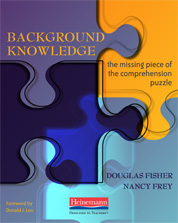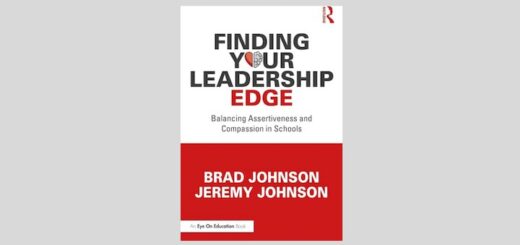Theory Rooted in Rich Research
Background Knowledge: The Missing Piece of the Comprehension Puzzle
by Douglas Fisher and Nancy Frey
(Heinemann, 2009 – Learn more)
In Background Knowledge: The Missing Piece of the Comprehension Puzzle, Douglas Fisher and Nancy Frey chose an essential topic. They focus their discussion on the three dimensions that support new learning: organization, conditionality and transferability.
More importantly, they asked three essential questions:
• How can we activate background knowledge?
• How can we access background knowledge?
• How can we build background knowledge?

While many of these techniques are probably familiar to experienced teachers, embedding their descriptions in real classroom activates offers new insights on how and when to use them. Undoubtedly these descriptions will be valuable to teacher educators and beginning teachers. I leave out the details to entice teachers to check out these valuable resources themselves.
Fitting the techniques into larger instructional frameworks
To give the reader context, the authors describe four overarching frameworks that guide their thinking about teaching: the gradual release of responsibility, a learning cycle that begins with background knowledge, purposeful use of declarative-procedural-conditional knowledge questions and tasks, and a system for differentiating core and incidental knowledge.
The system for differentiating core and incidental knowledge is critical to using all of the other ideas in this text. As the authors say, a teacher’s first challenge is to differentiate between core and incidental knowledge for whatever topic or essential idea(s), question(s) or task(s) is being put forth. The method they suggest is based on four criteria: representation, transmission, transferability, and endurance.
Fitting the learning into a larger world context
As in almost all discussions of education in the 21st century, the authors venture into the cyberworld. Given how much and how often students get information and ideas from the Web, they begin a discussion of critical literacy. Here they rely on four processes described by van Sluys, Lewison, and Flint (2006): disrupting a common situation or understanding, examining multiple viewpoints, focusing on sociopolitical issues, and taking action. Again they bring these dimensions alive through classroom based examples.
In the next-to-last chapter, “New Literacies, Old Standards for Excellence,” the authors address a common issue: the relationship between the tool and the task. More specifically, we need to ask: Which tool best serves particular learners given the particular task?
Is teaching background knowledge the teacher’s job?
The final chapter asks teachers to consider their role in teaching for thinking (i.e., thinking habits in relation to background knowledge), and background knowledge as a process at the heart of every student-teacher interaction.
And, finally, the publisher has included a study guide that asks teachers to assess their own background knowledge about background knowledge.
Some readers are never satisfied
I suppose like many other readers, I always want more. Specifically, I would like to have seen a more in-depth discussion on memory (pages 15-19). There is such a rich literature on the role of both working and long term memory in learning, I think the topic warranted a deeper consideration.
I also believe misconceptions, and how that topic relates to discipline-based concept development, deserved more discussion. Again, there is a wealth of information out there. One of the significant issues with concept development and background knowledge is that students do not learn concepts well in the first place; therefore, they cannot transfer that knowledge nor take conditionality into account.
Fran Toomey is a Professor Emeritus at St. Michael’s College in Burlington, Vermont. She is a blogger and wiki developer with special interests in reading comprehension and learning how to learn. Her book reviews are written “from my point of view — a teacher educator asking whether this text would be valuable in coursework or professional development as required or recommended reading.” Her e-course on reading comprehension (based on the unpublished text SPOKES: A Cognitive Approach to Reading Comprehension by Toomey, Scobie, and Toomey) is under development.




































